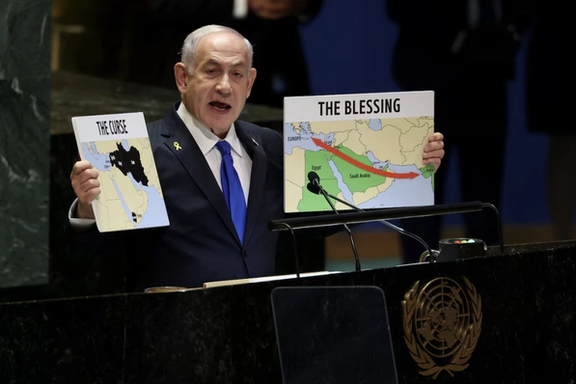"There is no place in Iran that the long arm of Israel cannot reach. And that's true of the entire Middle East. Far from being lambs led to the slaughter, Israel soldiers have fought back with incredible courage and with heroic sacrifice," Netanyahu said.
"We are winning," he added, after bombing attacks widely attributed to Israel and air strikes across Lebanon targeting Iran-backed Hezbollah killed over 600 people people.
Shortly after his speech, Israel launched its biggest air strike since a 2006 war on Beirut in what military officials said was an attack on Hezbollah's headquarters.
Netanyahu spoke in Biblical terms about the stakes for Israel in the region, between normalization agreements with moderate Arab states and more war with Iran and its armed allies.
"Moses told us that our actions will determine whether we bequeath to future generations a blessing or a curse, and that is the choice we face today, the curse of Iran's unremitting aggression, or the blessing of a historic reconciliation between Arab and Jews."
Netanyahu on Thursday appeared to brush off an initiative by the US and other world powers for a 21-day ceasefire between the Jewish state and Iran-backed Hezbollah, saying military operations would continue with "full force".
Top Israeli military commanders have mooted a possible ground invasion into Lebanon while Hezbollah and Iran have vowed to retaliate for Israeli attacks.
Netanyahu warned against allowing Iran a nuclear weapon - ambitions Iran denies - saying that while Israeli actions have delayed Iran's ability to build a bomb by a decade, they have not yet been stopped.
"Iran now seeks to weaponize its nuclear program... We must not let that happen," Netanyahu said.
Netanyahu's comments come days after Iran's new President Masoud Pezeshkian, speaking from the same rostrum at the UN General Assembly, expressed Tehran’s readiness to resume negotiations on a lapsed multilateral nuclear deal.
Earlier this month, Rafael Grossi, Director General of the International Atomic Energy Agency (IAEA), raised the alarm over Iran’s growing stockpile of uranium enriched to 20% and 60%, saying the country was closer to being able to produce nuclear weapons.
Netanyahu pointed to the Islamic Republic’s stifling of dissent, calling on the International community to end what he called global appeasement of Iran.
“For too long, the world has appeased Iran. It turns a blind eye to its internal repression. It turns a blind eye to its external progression. Well, that appeasement must end, and that appeasement must end now.”
The Islamic Republic has been criticized by rights groups for its continuing crackdown. These violations have escalated in the years since Iran’s 2022 Woman Life Freedom nationwide protests in which security forces killed at least 550 people and jailed tens of thousands.
Earlier this month, the UN's Fact-Finding Mission on Iran highlighted the Iranian authorities' escalating efforts to suppress the rights of women and girls.
“Meaningful accountability for gross human rights violations and crimes under international law, including crimes against humanity, remains elusive for victims and survivors," the mission wrote in a report.








